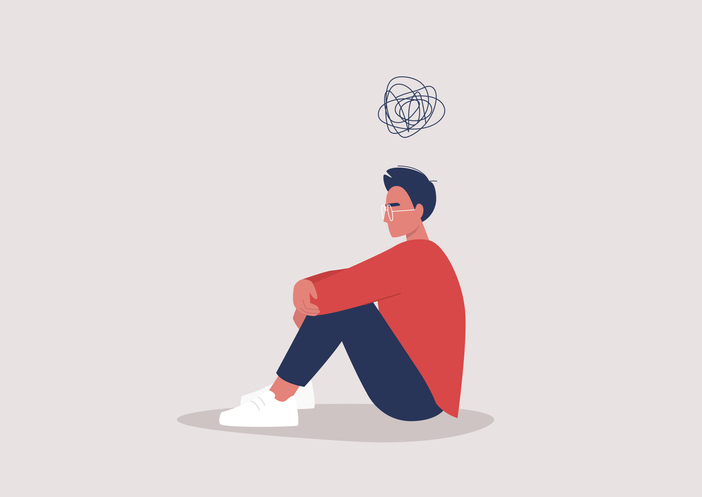
Now, this is the kind of post that could get me in hot water. For all kinds of reasons. Cold hearted. Self-serving. You can probably come up with more reasons yourself without much trouble.
My argument? That the COVID-19 pandemic has inflicted more harm because of the mental health fallout than the toll it has taken as a result of physical suffering and death.
“Yeah, right,” I can just hear you saying, “over 500,000 deaths in the US alone. Over 2.6 million fatalities world wide. And you’re going to try to persuade me that the undoubted mental health suffering caused by COVID is worse than the millions who’ve lost their lives? You gotta be kidding! And,” you can fairly add, “you’re just navel-gazing since we all know by now that you’re fixated on your own mental health problems with bipolar disorder and dementia.”
Okay. I get that.
But Consider . . .
Think, for a moment, about the emotional wreckage that this pandemic has left in its wake among survivors. The families that have been ripped apart by a loved one’s untimely death. The depression. The economic stress endured by the countless folks who’ve lost their jobs. The entrepreneurs who’ve seen the business they’ve spent years building vanish beneath the COVID tidal wave.
And, according to an article in Scientific American, the population most severely impacted? Young adults. But the pandemic has by no means neglected adults. A recent study by the U.S. Centers for Disease Control and Prevention found up to four times as many adults suffering from anxiety and depression compared to 2019. Suicide? Drug abuse? The precise numbers, of course, vary. But the statistics are consistently worse post-COVID. And minority populations were almost invariably the most severely impacted.
Still Not Convinced?
Consider this. The rate of mental distress being seen now is worse than what was experienced after such large scale traumas as September 11 and Hurricane Katrina.
An unanticipated finding of the surveys was the outsized toll on young adults. In the CDC survey, 62.9 percent of 18- to 24-year-olds reported an anxiety or depressive disorder, a quarter said they were using more drugs and alcohol to cope with pandemic-related stress, and a quarter said they had “seriously considered suicide” in the previous 30 days. Young adults were also the most affected age group in an unusual, real-time study that tracked the rapid rise in “acute distress” and depression at three points between mid-March and mid-April.
But why is it surprising that young people seem to be more severely impacted by the pandemic? Think about it. It’s not the young, in general, who are getting sick and dying. Why are they so upset?
Consider the milestones and connections that many of them are missing. Their buddies at school. Graduation ceremonies. Weddings. Their senior year of high school and college. With raging hormones and social pressures, navigating young adulthood is tough under the best of circumstances. Pile on COVID clamp downs and these are far from the best of times for young people.
“Round Up The Usual Suspects”
And what are a lot of folks doing when they’re cooped up at home with too much time on their hands? You guessed it: TV. And the remedy? Watch less of it. Especially the news shows that take particular delight in feeding us a steady diet of doom and gloom. And that’s not just me spouting off. The same CDC study recommends that we “limit media consumption and avoid sensationalist reports.”
But it’s not just about what we shouldn’t do. In the same Scientific American article reference above, Psychologist James Pennebaker of the University of Texas advises that “maintaining social contacts—via Zoom, phone or other COVID-safe methods—is also vital.”
“Yeah, But What About You?”
Good question. Between my bipolar disorder, NPH, and creeping dementia, I have more than my fair share of mental disorders to worry about. But the strange thing is that I seem to be doing pretty well in that department.
Ten to twelve years back, bipolar pretty much had me on the ropes. Down in a suicidal swamp one week. Bouncing off the walls-and terrifying my family-when in the grips of a mania the next. But I eventually found a shrink who got me on the right meds and things have pretty well leveled off.
As an aside, getting adequate sleep is an important component of keeping the bipolar genie in the bottle. And, because I watched this podcast the other day, I went to the Calm website and signed up. The next two nights, when I woke up and couldn’t go back to sleep, I set my phone on the night stand, started listening, and Poof! Like magic, I was out cold in about 10 minutes. Don’t ask me how. But I sure prefer admittedly sappy music and happy talk to sleeping pills.
And as for the Normal Pressure Hydrocephalous? Admittedly, not so great. They’ve checked the brain shunt that was put in my head repeatedly over the years. And it’s functioning as it should. But the Weird, Wet and Wobbly symptoms seem to continue to get worse-albeit slowly-as I age. I suppose that’s why they say this getting old stuff isn’t for sissies!
Hold The Presses!
My wife and I went in to see my new Kaiser GP yesterday to discuss my creeping dementia. Using their nifty online communication tool, he got back to me today. But . . . . that’s the topic for my next post.




Lots to think about. I’m glad I’m not in my twenties. Looking back is better than looking forward right now.
Debbie, Great to hear from you. Wishing you well down in Mexico!
Debbie, Went to the Denver Botanic Gardens w/Abbey and her two daughters today. Delightful! Learned more about the concern for Tom in the Philippines. I’ll pray.
It seems undeniable that just about everyone has suffered mentally to some degree over the last year. And the physical problems—weight gain, alcoholism, increased heart disease, domestic abuse— are by-products of what we have had to do to keep from losing even more friends and family. It’s a vicious cycle.
Linda, Thanks again for the visit. This has been a tough year in SO many ways.
One big thing that you missed here for youth & young adults that is a MAJOR issue for mental health in young adults is social media and video games. Not so sure tv is what is doing it. And the way people are experiencing true addiction to these things, they aren’t served by the “just don’t do it” anti-drug campaigns of the 90s. We have a serious issue on our hands, one I hope we can get under control before my kids enter that world.
Jocelyn, Thanks so much for the visit and comment. Very glad to get the perspective of someone significantly younger. Want to be my social media consultant?!